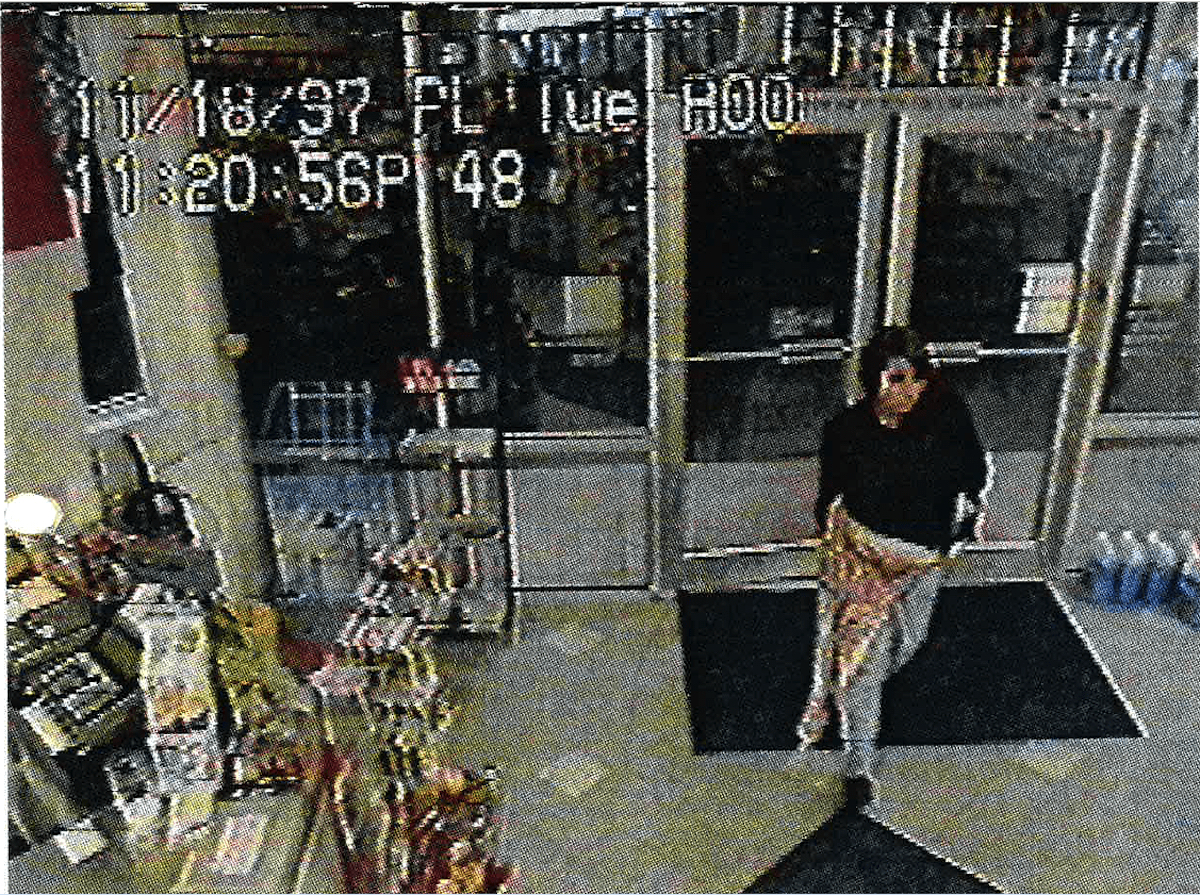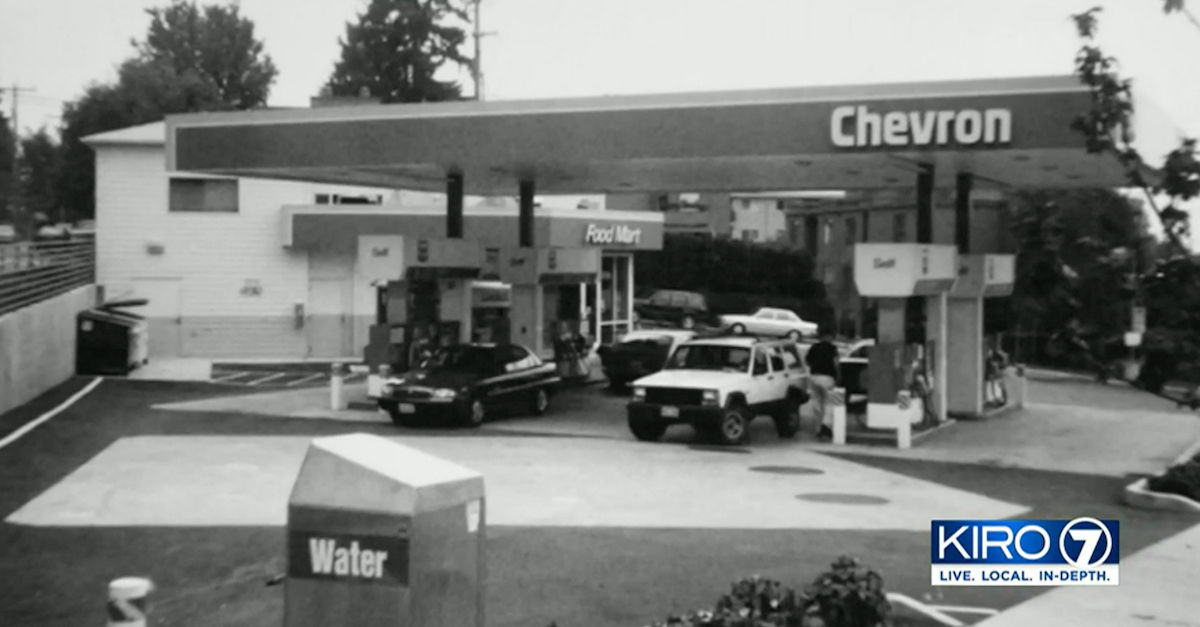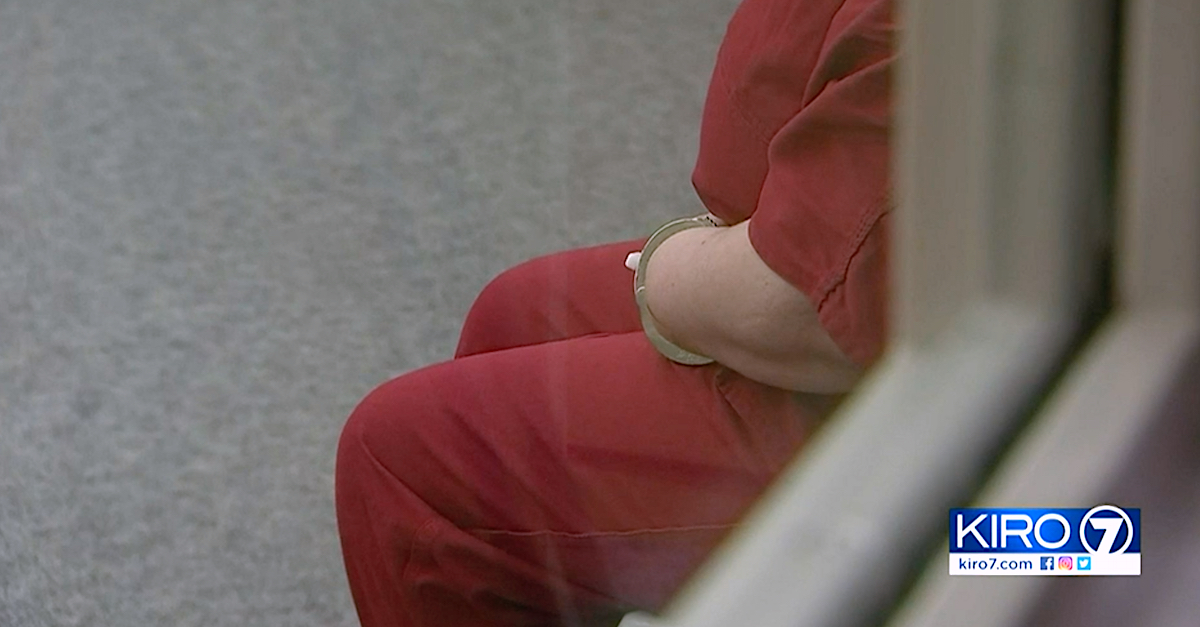
A surveillance image from a Seattle gas station captured a woman police believe to be Christine Marie Warren. (Image via the Seattle Police Department.)
Seattle police say they used online DNA databases to link a now-50-year-old woman to the possible killing of her own newborn baby in 1997. According to an online police blotter, the woman, whose name was initially not released, dumped her own baby boy’s body into a gas station restroom trash can on the border of Seattle’s Maple Leaf and Wedgwood neighborhoods 23 years ago.

This Seattle gas station is where police say the baby’s remains were found. (Image via screen capture from KIRO-TV.)
The King County prosecutor’s office subsequently confirmed for Law&Crime that the mother’s name is Christine Marie Warren. Local jail records reviewed by Law&Crime also contain Warren’s name. Those records indicate Warren was arrested March 11 as part of a homicide investigation. She was booked at 1:15 p.m. and was being held as of Saturday on a $10,000 bail. Warren appeared in court briefly on Friday, but a judge refused to allow television cameras to capture her face according to local CBS affiliate KIRO-TV. That same judge found that probable cause existed for a charge of second-degree murder, but the local prosecutor’s office told Law&Crime that a formal charging decision would not occur until Monday.

Christine Marie Warren sits in court. (Image via screen capture from KIRO-TV.)
Employees found the infant boy’s body on Nov. 20, 1997, at a Chevron gas station in the 8700 block of Lake City Way Northeast. “The King County Medical Examiner determined the child was born alive, and SPD detectives began investigating the case as a homicide,” the online blotter states. The Seattle Times reported that the infant was believed to have been born two days before its body was found.
The little boy’s death was a high-profile matter in Seattle when it occurred. Police released gas station surveillance video which they believe showed the child’s mother on the premises. While police did receive numerous leads in 1997, they say they were “unable to identify the woman” depicted in the images.
“However, investigators were able to obtain DNA evidence from the scene,” the blotter states. “This evidence was entered into the Washington State Patrol Crime Lab’s database.”
The community banded together to collect donations for a funeral for the infant boy and for a headstone to mark his grave. A marker in North Seattle’s Calvary Cemetery reads “Baby Boy Doe: November 18, 1997. We Care.”
For more than two decades, no DNA matches occurred until Seattle Police detectives began re-investigating the matter in 2018. Authorities “obtained information from a public genealogy website and found a woman who was both a possible DNA match and fit the description of the woman seen on the gas station’s surveillance footage,” the online blotter reads. The police then “conducted an undercover operation and obtained the woman’s DNA, which was a match for a sample in the state’s crime lab database.”
The Seattle investigation is remarkably similar to the pattern popularized by California authorities in their quest to find the so-called Golden State Killer. DNA evidence in dozens of connected cases languished for years until detectives uploaded it to the open-source DNA website GEDMatch. From there, investigators narrowed down the killer’s family tree until they identified former police officer Joseph James DeAngelo, Jr. as the man who likely matched DNA samples recovered from various crime scenes. Officers later collected DNA from trash outside DeAngelo, Jr.’s home and from his car door handle to ensure they had the right person before making an arrest. DeAngelo, Jr. pleaded guilty to a litany of offenses and is currently serving 12 life sentences in prison.
Indeed, both KIRO-TV and the Seattle Times reported that Barbara Rae-Venter, the “famous DNA sleuth” who solved the Golden State Killer mystery, helped Seattle police track down Warren, the mother they believe gave birth to Baby Boy Doe.
The television station’s report says Warren had previously uploaded her own personal DNA to an online genealogy website “and opted not to make her data private.” In other words, the detective work was likely not as time consuming as it was in other, similar cases where officers have combed through dozens of family links before narrowing in on a potential suspect.
The report also says detectives mailed Warren a letter. When she responded, authorities collected her DNA from a stamp on the return envelope and tested it further for DNA. They said it was also a match.
KIRO further noted that the baby boy’s body might never have been found but for the fact that it was placed in a trash can containing a clear plastic liner.
The police department’s online blotter says officers interviewed Warren before she was placed under arrest. KIRO described Warren as “fully cooperating” with the authorities. Court documents subsequently obtained by Law&Crime from the King County Prosecuting Attorney’s Office say Warren “admitted to giving birth to the victim in the convenience store bathroom in 1997 and discarding the victim in the trash.”
The documents are silent as to the details of the interview; it’s unclear whether Warren elaborated further. However, the papers do provide additional critical details about what police believe happened 23 years ago.
“A witness told detectives that she was at the store on the night of November 18 and held the door open for a woman who had clothing or a towel wrapped around her waist and went straight into the bathroom,” the documents state. “The witness stated that she heard a baby cry from inside the bathroom. Detectives recovered security video from that night which showed the suspect, the mother of the victim, enter the store, go straight to the bathroom, and exit approximately 15 minutes later. In 1998 a DNA profile belonging to the suspect was identified from analysis of the placental blood clot attached to the victim.”
Similar open-source DNA techniques recently led Colorado authorities to a man they believe killed a young woman in her home in 1981.
Nearly five years after the recovery of Baby Boy Doe’s body, the State of Washington enacted a “Safe Haven Law” which allows mothers to leave newborn babies at hospitals, fire departments and rural health clinics — with no or minimal questions asked.
“A parent of a newborn who transfers the newborn to a qualified person at an appropriate location is not subject to criminal liability under” several sections of Washington State law, the 2002 statute indicates. “The qualified person at an appropriate location shall not require the parent transferring the newborn to provide any identifying information in order to transfer the newborn.”
The legislative intent behind the law is also noted within the statute.
“The legislature intends to increase the likelihood that pregnant women will obtain adequate prenatal care and will provide their newborns with adequate health care during the first few days of their lives,” it reads. “The legislature recognizes that prenatal and postdelivery health care for newborns and their mothers is especially critical to their survival and well-being. The legislature does not intend to encourage the abandonment of newborn children . . . but rather to assure that abandonment does not occur and that all newborns have an opportunity for adequate health care and a stable home life.”
The law was amended in 2018 after “the body of a newborn girl was found near the side of a road in North Bend, Washington, wrapped in a blanket,” the statute reads. “The newborn was less than half a mile away from Snoqualmie valley hospital, a location where infants can be safely and anonymously surrendered under Washington state’s safety of newborn children law.”
All fifty states currently have “Safe Haven” or “Baby Moses” laws on the books.
[Editor’s note: this report was updated Sunday, March 14, to include additional details from court records provided by the local prosecutor’s office.]